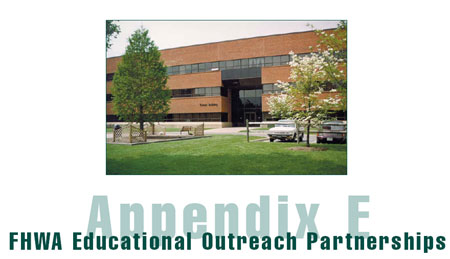FY 2003 Performance Report

To encourage a new generation of transportation professionals, TFHRC annually gives hundreds of students the opportunity to learn firsthand about the career options available in
transportation research. Outreach programs with local schools and active participation in such programs as the Garrett A. Morgan Technology and Transportation Futures Program, a USDOTwide initiative, provides opportunities to increase awareness of transportation and related skills among children and adults. Since its inception in 1997, the program has increased
awareness of math, science, and transportation technology for 2 million children and young adults. Programs like this one find and develop our future workforce.
Dwight David Eisenhower Transportation Fellowship Program
DDETFP, initiated in 1991 and reauthorized by the TEA-21, awards fellowships to undergraduate, graduate students, and faculty annually. The program will award $24 million by 2003 to prospective transportation professionals. Fellowship categories are: Grants for Research; Graduate; Faculty; Historically Black Colleges and Universities (HBCU); Hispanic Serving Institutions; and Tribal Colleges.
Minority Institutes of Higher Education
One of FHWA’s goals is to strengthen the ties between the RD&T program and MIHEs. There are several ways of achieving this goal. For example, we provide research grants and offer summer employment opportunities for MIHE faculty and students. This fosters MIHE RD&T activities that
contribute substantially to FHWA’s mission and prepare faculty and students at MIHEs to participate successfully in the competitive research arena.
The National Highway Institute
NHI, FHWA’s technical training organization, develops and administers transportation-related training and educational programs that support new technology applications for planning, designing, constructing, maintaining, operating, and rehabilitating our Nation’s transportation infrastructure. NHI offers training to Federal, State, and local transportation agencies, and increasingly, to the private sector. NHI provides technical course materials for inclusion in undergraduate and graduate curricula, and collaborates with community colleges, technical schools, and secondary and grade schools to identify the transportation professionals of tomorrow.
The National Summer Transportation Institutes for Secondary Students
The NSTI offers a 4-week introduction to all modes and careers in transportation as well as academic enhancement activities. The on-campus sessions are designed to encourage a diverse cadre of motivated middle- and high-school students to pursue transportation careers and to address the need for a welltrained, qualified, diverse workforce in the 21st century. To date, the NSTI host sites include HBCUs and other minority institutions of higher education across the Nation, with
South Carolina State University serving as the Institutes’ National Research and Technology Product Distribution Center. FHWA celebrated the 10-year anniversary of the program in May
2003, and announced two new goals for the program. Under the FHWA plan, NSTI programs, which are now in 26 States, plus the District of Columbia and Puerto Rico, would be established in all 50 States. In addition, the Agency would like to increase to 10,000 the number of secondary school students introduced to the transportation industry and transportation-related careers. Both goals are to be achieved in the next 5 years.
The Summer Transportation Internship Program for Diverse Groups
Since 1991, the USDOT headquarters has provided 10-week summer college-level STIPDG internships. In 1999, it expanded to include field office placements for a maximum of 100
students each year. In 2003, we employed 2 STIPDG students at TFHRC for 60 days, one from Texas Southern University and the other from the University of Wisconsin. We also hosted a briefing and tour for the entire program class of 97 interns.
University Transportation Centers Program
The UTC Program funds 26 universities, including consortia representing more than 70 colleges and universities, to advance U.S. technology and expertise in the many disciplines
comprising transportation through the mechanisms of education, research, and T2 at university-based centers of excellence. Each UTC is required to meet TEA-21-mandated program goals in transportation research, education, and workforce development, and T2 as part of the terms of the UTC grant. The UTC Program is authorized $227.8 million in funding over the 6-year authorization period of TEA-21. FHWA, along with FTA, transfers funds to RSPA’s Office of Innovation, Research, and Education, which administers the program in coordination
with FHWA. FTA, and other interested USDOT administrations. The University Transportation Education Resource Catalog provides information on USDOT and FHWA educational initiatives,
along with Web site links to transportation-related opportunities.
Universities and Grants Programs (U&GP)
FHWA supports a number of key initiatives under the U&GP, which is funded separately from the RD&T program. The mission of the U&GP is to promote transportation education
benefits and encourage transportation research pursuits among university students and faculty. The U&GP program works cooperatively with more than 750 universities throughout the United States. Its primary objectives are to enhance FHWA university-based programs and other academic programs that provide fellowships, internships, and partnerships; conduct workforce analyses related to retention, recruitment, and diversification; and conduct research on USDOT’s and
FHWA’s transportation-related academic programs to promote transportation education benefits and encourage transportation research pursuits among university students and faculty.
Previous | Table of Contents | Next
Performance Report Feedback
|
